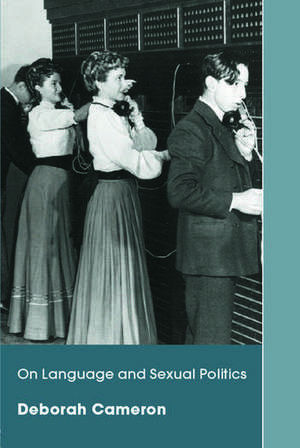On Language and Sexual Politics
Autor Deborah Cameronen Limba Engleză Paperback – 3 feb 2006
The collection’s overarching theme is the political relationship between language and gender: four distinctly themed sections demonstrate that a variety of forces affect gender relations, and gender representations, in different times and places. Cameron examines the connections between language and the (mis)representation of reality, and the role language plays in reproducing gender inequalities. More recent articles focus on representations of men and women as communicators, as well as the impact of sexuality on gender and gender relations, an increasingly prominent area of the author’s research.
This timely study brings much of Cameron’s work together for the first time, and highlights characteristics of her work with which many readers will be familiar: a combination of linguistic and feminist political orientation; and a distinct focus on conflict in gender relations. Including a new introductory essay and eleven articles, three of which are previously unpublished, with short introductions to contextualize each piece, the collection is extremely useful for students and teachers on a variety of courses including English language and linguistics, women’s studies, gender studies and communication studies.
| Toate formatele și edițiile | Preț | Express |
|---|---|---|
| Paperback (1) | 410.46 lei 6-8 săpt. | |
| Taylor & Francis – 3 feb 2006 | 410.46 lei 6-8 săpt. | |
| Hardback (1) | 999.98 lei 6-8 săpt. | |
| Taylor & Francis – 3 feb 2006 | 999.98 lei 6-8 săpt. |
Preț: 410.46 lei
Nou
78.54€ • 82.00$ • 65.00£
Carte tipărită la comandă
Livrare economică 05-19 aprilie
Specificații
ISBN-10: 0415373441
Pagini: 206
Ilustrații: 3 tables and 3 halftones
Dimensiuni: 156 x 234 x 11 mm
Greutate: 0.32 kg
Ediția:1
Editura: Taylor & Francis
Colecția Routledge
Locul publicării:Oxford, United Kingdom
Public țintă
PostgraduateCuprins
Acknowledgements Introduction: On language and sexual politics Part 1: The Sexual Politics of Representation 1. Sexism and Semantics (1984) 2. Nonsexist Language: Lost in Translation? (1995) 3. Language, Sexism and Advertising Standards (2004) Part 2: Power and Difference 4. Lakoff in Context: The Form and Function of Tag Wuestions (with Fiona McAlinden and Kathy O’Leary, 1988) 5. Performing Gender Identity: Young Men’s Talk and the Construction of Heterosexual Masculinity (1997) 6. ‘Is there any ketchup, Vera?’ Gender, Power and Pragmatics (1998 ) Part 3: Ideologies of Language and Gender 7. Verbal Hygiene for Women: Linguistics Misapplied? (1994) 8. Styling the Worker: Gender and the Commodification of Language in the Globalized Service Economy (2000) 9. Men are from Earth, Women are from Earth (2003) Part 4: Language, Gender and Sexuality 10. Naming of Parts: Gender, Culture and Terms for the Penis among American College Students (1992) 11. Straight Talking: The Sociolinguistics of Heterosexuality (2002) Notes Bibliography Index
Notă biografică
Deborah Cameron currently holds the Rupert Murdoch Chair of Language and Communication at Oxford University. A sociolinguist and feminist, she is the author of Verbal Hygiene (1995) and The Feminist Critique of Language (1998), and co-author with Don Kulick of Language and Sexuality (2003).
Recenzii
Descriere
This collection of articles presents a selection of Deborah Cameron’s work on language, gender and sex in one single volume. Arranged thematically, this book covers major developments in Anglo-American feminist linguistics, and Cameron’s responses to these, spanning the last twenty years.
The collection’s overarching theme is the political relationship between language and gender: four distinctly themed sections demonstrate that a variety of forces affect gender relations, and gender representations, in different times and places. Cameron examines the connections between language and the (mis)representation of reality, and the role language plays in reproducing gender inequalities. More recent articles focus on representations of men and women as communicators, as well as the impact of sexuality on gender and gender relations, an increasingly prominent area of the author’s research.
This timely study brings much of Cameron’s work together for the first time, and highlights characteristics of her work with which many readers will be familiar: a combination of linguistic and feminist political orientation; and a distinct focus on conflict in gender relations. Including a new introductory essay and eleven articles, three of which are previously unpublished, with short introductions to contextualize each piece, the collection is extremely useful for students and teachers on a variety of courses including English language and linguistics, women’s studies, gender studies and communication studies.




























